|
|
|
Sort Order |
|
|
|
Items / Page
|
|
|
|
|
|
|
| Srl | Item |
| 1 |
ID:
156609
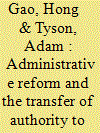

|
|
|
|
|
| Summary/Abstract |
In this article, we examine the administrative functions that have been carried out by social organizations (SOs) in China since 2013. We use evidence from Guangdong to demonstrate that the transfer of authority to SOs is selective, tends to create more burdens for local government, and generally does not lead to greater autonomy for SOs. We focus on five types of SOs that are undertaking new administrative functions with varying degrees of operational autonomy, which relates to the consultative authoritarian model proposed by Jessica Teets. Consultative authoritarianism allows for the expansion of relatively autonomous SOs and the development of indirect state control mechanisms. The model is designed to improve governance without democratization by expanding the role played by intermediaries such as SOs in public administration and service delivery. The evidence from Guangdong permits us to conclude that the transfer of authority to SOs allows for innovations in public administration, but that politics continues to motivate government decisions as to which functions are suitable for SOs to undertake, casting doubt on the ability of the Chinese Communist Party to achieve sustainable improvements in local governance and public service provision.
|
|
|
|
|
|
|
|
|
|
|
|
|
|
|
|
| 2 |
ID:
086856
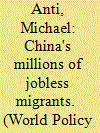

|
|
|
|
|
| Publication |
2009.
|
| Summary/Abstract |
Guangdong, China- With the Premier's encouragement, we have exceeding confidence. Zhang Wengui, 21, a peasant worker from Sichuan province, reads the slogan from a help-wanted board at the Likai Shoes factory on the outskirts of noisy Houjie Town, some 30 miles from Guang-zhou, the capital of industry -heavy guangdong province.
|
|
|
|
|
|
|
|
|
|
|
|
|
|
|
|
| 3 |
ID:
148772
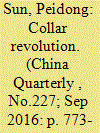

|
|
|
|
|
| Summary/Abstract |
Scholars have paid little attention to Maoist forces and legacies, and especially to the influences of Maoism on people's everyday dress habits during the Cultural Revolution. This article proposes that people's everyday clothing during that time – a period that has often been regarded as the climax of homogenization and asceticism – became a means of resistance and expression. This article shows how during the Cultural Revolution people dressed to express resistance, whether intentionally or unintentionally, and to reflect their motivations, social class, gender and region. Drawing on oral histories collected from 65 people who experienced the Cultural Revolution and a large number of photographs taken during that period, the author aims to trace the historical source of fashion from the end of the 1970s to the 1980s in Guangdong province. In so doing, the author responds to theories of socialist state discipline, everyday cultural resistance, individualism and the nature of resistance under Mao's regime.
|
|
|
|
|
|
|
|
|
|
|
|
|
|
|
|
| 4 |
ID:
178712
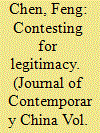

|
|
|
|
|
| Summary/Abstract |
‘Worker Representation’ (WR) originated as a spontaneous practice backed by workers’ collective actions in response to the failed role of trade unions. It allows workers to bargain with employers in a somewhat organized manner, thus facilitating the possibility of voluntary negotiations for dispute settlement. WR activists have sought to regularize the practice and establish its legitimacy in pragmatic, normative and cognitive terms. Yet WR poses a dilemma to the government, as it brings two divergent outcomes: it provides solutions to labor disputes and it inspires labor activism. As a result of its dual institutional logic of dispute resolution and stability maintenance, the government’s response to WR has oscillated between accommodation and suppression.
|
|
|
|
|
|
|
|
|
|
|
|
|
|
|
|
| 5 |
ID:
159340
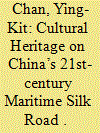

|
|
|
|
|
| Summary/Abstract |
This article suggests that Chinese scholars in Guangdong, through historical work endorsed or sponsored by their government, justify the inclusion of Southeast Asian nations in the 21st-century Maritime Silk Road (MSR) initiative. In doing so, they seek to add the MSR to the United Nations Educational, Scientific and Cultural Organization’s (UNESCO) World Heritage List. By exploring how historians and officials adhere to the expectations of the Chinese state and UNESCO in highlighting Guangdong’s role in the 21st-century MSR initiative, the article examines the production of cultural heritage at the local level in contemporary China.
|
|
|
|
|
|
|
|
|
|
|
|
|
|
|
|
| 6 |
ID:
145887
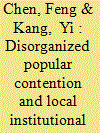

|
|
|
|
|
| Summary/Abstract |
Concurring with the approach stressing the role of contentious politics in (re)shaping state institutions, this study explores how disorganized popular contentions configure local institutional building in China. As Chinese citizens are not legally allowed to take organized collective action to express their grievances and demands, popular contentions, despite their common origins, similar claims and identical targets, break out here and there in large numbers without clear organizational shape. This compels the government to build institutions able to map scattered conflicts, detect potential problems and defuse them on a case-by-case basis in a timely fashion. Such a dissipative approach is distinguished, by its purpose, format and mechanism, from two common types of state responses to popular contentions—incorporation and repression—which are typically linked to democracies and authoritarian developing states where popular contentions are often organized in various ways.
|
|
|
|
|
|
|
|
|
|
|
|
|
|
|
|
| 7 |
ID:
132947
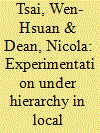

|
|
|
|
|
| Publication |
2014.
|
| Summary/Abstract |
Reforms carried out by the Chinese Communist Party (CCP) have long followed a traditional model of "experimentation under hierarchy." This article will attempt to develop this model further by building a framework to illustrate the influence of both the political dynamics of hierarchical central-local relations and local economic circumstances in the introduction of large-scale political reforms. The initiation and expansion of "experimental points" are only permitted in those select few provinces with both favourable political and economic local conditions, allowing the CCP to minimize risk and make informed decisions regarding possibilities for nationwide reform. This article proposes that the hierarchical interaction of central and local political elites, and in particular provincial secretaries, can explain the extent of reforms, whereas the type of reform is linked to distinct provincial economic conditions and the provincial secretary's interpretation of provincial priorities. Put succinctly, the CCP's model of political reform can be specifically characterized as "experimentation under hierarchy in local conditions." This article presents a detailed discussion of both the political and economic considerations inherent in this concept, and provides examples of reform programmes in Guangdong and Sichuan to illustrate the model in practice.
|
|
|
|
|
|
|
|
|
|
|
|
|
|
|
|
| 8 |
ID:
122934
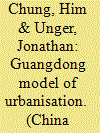

|
|
|
|
|
| Publication |
2013.
|
| Summary/Abstract |
In some parts of China - and especially in Guangdong Province in southern China - rural communities have retained ownership of much of their land when its use is converted into urban neighbourhoods or industrial zones. In these areas, the rural collectives, rather than disappearing, have converted themselves into property companies and have been re-energised and strengthened as rental income pours into their coffers. The native residents, rather than being relocated, usually remain in the village's old residential area. As beneficiaries of the profits generated by their village collective, they have become a new propertied class, often living in middle-class comfort on their dividends and rents. How this operates - and the major economic and social ramifications - is examined through onsite research in four communities: an industrialised village in the Pearl River delta; an urban neighbourhood in Shenzhen with its own subway station, whose land is still owned and administered by rural collectives; and two villages-in-the-city in Guangzhou's new downtown districts, where fancy housing estates and high-rise office blocks owned by village collectives are springing up alongside newly rebuilt village temples and lineage halls.
|
|
|
|
|
|
|
|
|
|
|
|
|
|
|
|
| 9 |
ID:
086715
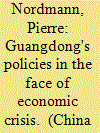

|
|
|
|
|
| Publication |
2009.
|
| Summary/Abstract |
Economic crisis hit Guangdong, the southern province bordering Hong Kong and Macao, just as its growth rate was slowing after many years of acceleration. Current economic policies seek to reverse that trend more than to tackle the crisis.
|
|
|
|
|
|
|
|
|
|
|
|
|
|
|
|
| 10 |
ID:
183436
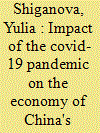

|
|
|
|
|
| Summary/Abstract |
China is one of the world's largest manufacturers, exporters, foreign investors, and consumer markets. In recent years, the country's economy has been influenced by domestic and foreign factors, the transformation of the world economy, and trade wars with the United States. A new coronavirus pandemic that would spread gradually around the world began at the start of 2020, designated as the target year to finish creating a comprehensive moderate prosperity society (xiaokang shehui) in China, victory over poverty, and the end of the 13th Five-Year Plan period (2016-2020). This massive event would greatly impact the lives of people and the economy of such a densely populated and economically powerful country as China. This article considers the degree to which the new disease affected the development of the economy of its leading economic center, Guangdong Province, in 2020.
|
|
|
|
|
|
|
|
|
|
|
|
|
|
|
|
| 11 |
ID:
182941
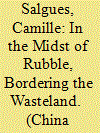

|
|
|
|
|
| Summary/Abstract |
Drawing from two ethnographic studies of children, one in a former industrial neighbourhood in the process of demolition in Shanghai, and the other in a rural town in Guangdong, this article explores the relationships children form with the landscape of ruins as they wander about with the aim of identifying the opportunities these offer in terms of games, freedom, and sharing, etc. The article analyses two different dynamics in the types of ruins and the experiences associated with them: concentration and dispersion. The structural geography and qualitative demography that emerge from this are barely mentioned in Chinese public debate, in its categories (children of “migrant workers” or “left-behind” children), its problems, and its very negative representations, but whilst they underline the unequal divisions in society, they also reveal a richness of experience that is far from being necessarily unhappy.
|
|
|
|
|
|
|
|
|
|
|
|
|
|
|
|
| 12 |
ID:
128157


|
|
|
|
|
| Publication |
2013.
|
| Summary/Abstract |
The paper offers an updated picture of the policies implemented by the government of the Guangdong Province (China) to foster the industrial development and the technological upgrading of its territories. Among these policies is the promotion and the institutional acknowledgement of a growing number of industrial clusters, defined as "Specialised Towns", characterized by a high spatial concentration of firms producing one specific item (or a limited range of similar products). In the view of the provincial and local governments these types of industrial development programs are used to increase firm agglomerations, spatial concentration and visibility, which in turn leads to increased specialisation, industrial output, innovation and economic growth. However, little specific empirical evidence has been collected to support this view and the debate, at the national and international level, on the effectiveness of such interventions seems to be still largely ideological. The paper offers a contribution in this sense by offering a detailed description of the policy tools, by suggesting synthetic indexes to quantify policy efforts and industrial performances in Guangdong territories and by providing a first statistical analysis of these indexes.
|
|
|
|
|
|
|
|
|
|
|
|
|
|
|
|
| 13 |
ID:
072724
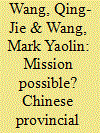

|
|
|
|
|
| Publication |
2006.
|
| Summary/Abstract |
Despite its rubber-stamp image, the involvement of China's unicameral legislature (People's Congress, PC) in the country's environmental governance has become more visible in recent years. Using an environmental dispute taking place in the county-city of Sihui, Guangdong Province as a case study, this paper examines how the congress deputies at the provincial level were involved in the domestic environmental controversy, which comprised a landmark congressional inquiry into the provincial environmental authorities. Through dissecting the practice and behaviour of the Guangdong Provincial PC and its deputies in relation to the environmental dispute settlement, the paper recognises the inquiry as an achievement test, and unravels the political and institutional roots of China's environmental governance from a congressional perspective.
|
|
|
|
|
|
|
|
|
|
|
|
|
|
|
|
| 14 |
ID:
178305
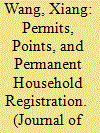

|
|
|
|
|
| Summary/Abstract |
China’s New-type Urbanisation Plan heralded a new phase of reform of the household registration (hukou) system and initiated a nation-wide reconfiguration of hukou policy in Chinese cities. This study reveals that the former localisation of hukou policymaking has been brought to greater uniformity under the current central guidelines. The liberalisation of hukou conversion has been expanded to many large cities that previously employed selective migrant integration policies. Mega-cities have recalibrated the selection criteria for new citizens, elevating the importance of settlement duration and moderating the importance of educational and professional qualifications. Case studies in Guangdong further reveal the dynamic interactions among different levels of government in the course of reform. Local policy experimentations set important precedents for central policymaking, and the central guidelines are enforcing new adjustments in local implementation. The provincial government plays a prominent role in coordinating top-down directives and local conditions.
|
|
|
|
|
|
|
|
|
|
|
|
|
|
|
|
| 15 |
ID:
092581
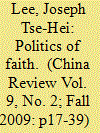

|
|
|
| 16 |
ID:
193210
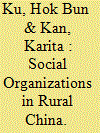

|
|
|
|
|
| Summary/Abstract |
This article examines the government purchase of social services in China as a window by which to investigate the evolving relations between the party-state and social organizations. Going beyond the conventional focus on state–non-governmental organization (NGO) dynamics in urban areas, we explore the expanded role of social organizations in rural service provision under state-led campaigns of rural modernization. Engaging with institutional theory and the consultative authoritarianism thesis, we argue that NGOs initially operated in an emerging organizational field where they exercised considerable autonomy in setting agendas and designing services. As the party-state's incentives to utilize and co-opt the social work profession grow, however, we observe a trend towards incorporation, wherein social workers now play a bigger role alongside the strengthening of state control over the sector. Through tracing the inception and eventual termination of a decade-long social service project in Guangdong, this article shows how state incorporation might undermine the future role of NGOs in rural development.
|
|
|
|
|
|
|
|
|
|
|
|
|
|
|
|
| 17 |
ID:
180651
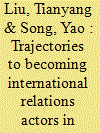

|
|
|
|
|
| Summary/Abstract |
While Chinese paradiplomacy has received growing academic attention, little is known about how different provinces within China act as international relations players of their own accord. This paper adopts a comparative perspective to address this gap. It develops three dimensions of international actorness (authority, motivation, and instruments) to examine whether and how Chinese provinces have satisfied the criteria for being international relations actors through their engagements in the Belt and Road Initiative (BRI). Using Guangdong and Yunnan as examples, this paper casts light on the plural occasions in which the de-centralized state control of foreign affairs and the growing external activism of provincial entities have worked in tandem to widen the footprints of said provincial entities in the countries of the BRI. Drawing on Guangdong-Hong Kong competition and Yunnan-Guangxi rivalry, this paper unpacks the motivations of provincial engagements in the BRI by exploring the utility of imitation tactics used to gain comparative advantages vis-à-vis their domestic counterparts. While comparing the Guandong and Yunnan’s leveraging of strategic instruments, this paper also reveals Guangdong’s strong globalist, mercantile mentality in its external interactions, in contrast with the more regionalist and stability-oriented approach of Yunnan.
|
|
|
|
|
|
|
|
|
|
|
|
|
|
|
|
| 18 |
ID:
177958


|
|
|
|
|
| Summary/Abstract |
The Three Gorges Dam project (1994–2009) in Chongqing of China created 1.35 million forced migrants. As the region next to the reservoir could not accept all the displaced, 96,000 were relocated to 11 provinces/cities. Among these “out-bound” (waiqian) migrants, 9,007 were moved 2,300 kilometers away to coastal Guangdong from 2000 to 2004. Through soliciting testimonies from 32 young-adult “dam migrants” (currently aged 18–39) in Guangdong, this article identifies a commonly shared ambivalence over the meaning of displacement such that the informants—after more than a decade of resettlement—still maintain different degrees of feeling as both a stranger and a local, as both a Guangdonger (Guangdong ren) and a Chongqinger (Chongqing ren), and as both a sojourner and a dweller. It is argued that they possess more complex movement imaginaries than older, first-generation migrants, and experience a more complex mode of marginalization. The political implications of the ambivalently mobile population are discussed as its existence echoes the emerging governmentality scholarship on the migrant experience.
|
|
|
|
|
|
|
|
|
|
|
|
|
|
|
|
| 19 |
ID:
119759
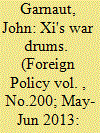

|
|
|
|
|
|
|
|